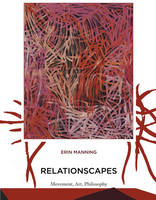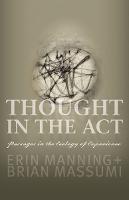Always More Than One: Individuation's DanceAuthor :
Paperback
Published : Wednesday 9 January 2013
You may also like ...

by
Paperback
03 Jun 2016
>>
€24.15
Extended stock - Dispatch 5-7 days

by
Paperback
17 Aug 2012
>>
€26.51
Extended stock - Dispatch 5-7 days

by
Paperback
01 May 2014
>>
€27.70
Extended stock - Dispatch 5-7 days

by
Paperback
09 Jan 2013
>>
€27.70
Extended stock - Dispatch 5-7 days
Description
The philosopher, visual artist, and dancer Erin Manning explores the concept of the more than human in the context of movement, perception, and experience.
In Always More Than One, the philosopher, visual artist, and dancer Erin Manning explores the concept of the more than human in the context of movement, perception, and experience. Working from Whitehead's process philosophy and Simondon's theory of individuation, she extends the concepts of movement and relation developed in her earlier work toward the notion of choreographic thinking. Here, she uses choreographic thinking to explore a mode of perception prior to the settling of experience into established categories. Manning connects this to the concept of autistic perception, described by autistics as the awareness of a relational field prior to the so-called neurotypical tendency to chunk experience into predetermined subjects and objects. Autistics explain that, rather than immediately distinguishing objects-such as chairs and tables and humans-from one another on entering a given environment, they experience the environment as gradually taking form. Manning maintains that this mode of awareness underlies all perception. What we perceive is never first a subject or an object, but an ecology. From this vantage point, she proposes that we consider an ecological politics where movement and relation take precedence over predefined categories, such as the neurotypical and the neurodiverse, or the human and the nonhuman. What would it mean to embrace an ecological politics of collective individuation?
Reviews